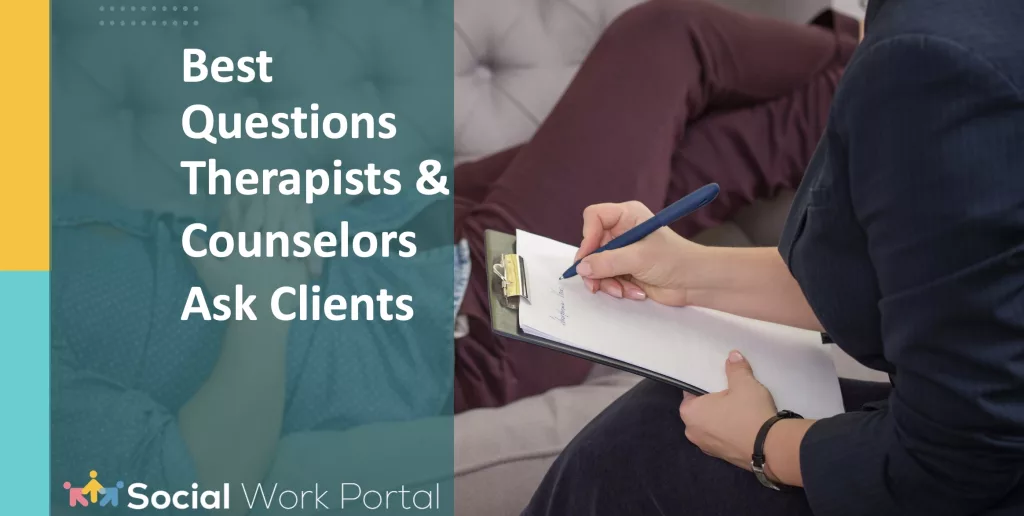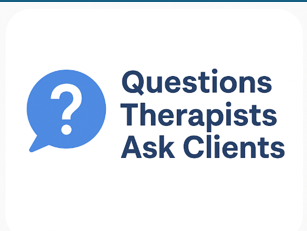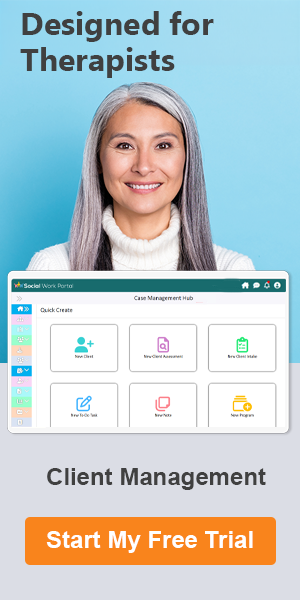75+ Powerful Questions Therapists & Counselors Ask Their Clients with Examples for Phone, Telehealth, and In-person Sessions
When it comes to building trust and facilitating meaningful progress in therapy, the questions therapists ask clients play a critical role. Whether you’re a social worker, mental health specialist, counselor or therapist, knowing the right therapeutic questions to ask can help uncover key client issues, deepen self-awareness, and support more effective treatment plans.
In this guide, we’ll explore powerful questions used in counseling sessions, covering key questions to ask for 1st, 2nd, and subsequent sessions, as well as intake questions, mental health assessments, and ongoing therapeutic conversations that help clients open up, reflect, and grow.
🧠 Client Use Case Example:
Let us review a use case to set the stage. Meet Maria, a fictional character. She is a 32-year-old professional, who started therapy due to ongoing anxiety.

During her third session, she still hadn’t fully opened up about her stress triggers. But the therapist didn’t ask “Why are you anxious?” which could feel invasive. Instead, she used open-ended, safe questions. Instead of pressing Maria, her therapist gently used open-ended questions like “What does a stressful day at work feel like for you?” and “When do you notice yourself reacting the most?”

These simple yet strategic therapy questions helped Maria feel heard without pressure. She was able to think out loud and identify patterns on her own. This allowed her to be more engaging and open – leading her to reveal specific moments where anxiety spiked, such as during team meetings or when checking emails late at night.

With this insight, the therapist was able to co-develop a targeted coping plan and track Maria’s progress using weekly reflection prompts from our free therapy question guide.
You can download the full list of questions here: Download Questions Therapists & Counselors Ask (PPT & PDF Versions)
Getting clients to open up and be their true selves is one of the greatest challenges that counselors and therapists face. Whether it’s in-person one-on-one therapy or group therapy, therapists and mental health professionals may find it challenging to come up with counseling questions that will make the clients comfortable and also keep the conversation naturally flowing.
The first and second counseling sessions are often the most challenging as it is during these two sessions that trust and rapport is developed with the patient client, and clients often have their guards up and might be resistant to.

Therapy Questions to Ask Clients
Let’s get started
Watch this overview video or read the guide below.
Would you like to share counselling question examples used by your organization? Do you have clinical interview questions that work best for you that you’ll like to share with other therapists, counselors, and mental health professionals? If so, contact the Social Work Portal Team.
Table of Contents: Best Counselling Questions Therapists Ask Clients
Keep on scrolling down this page to read each section or click any link below to go directly to that section.
- Types of Therapy/Counselling Questions
- Examples of Counseling and Therapists Questions to Ask
- Questions to Ask on the Phone
- First, Second, Third Therapy Session Questions to Ask Clients
- Therapeutic Questions to Ask Clients
- Group Therapy Questions
- Family Therapy Questions to Ask Clients
- Cognitive Behavioral Therapy Questions to Ask Clients
- Gestalt Therapy Questions to Ask Clients
- Questions Therapists Ask Depressed Patients
- Questions to Ask a Resistant Client
- Miracle Question – What is Solution Focused Brief Therapy?
- What’s the Importance of Questions in Counselling/Therapy?
- Download Free Slides – Questions Therapists and Counselors Ask Clients PPT & PDF
- Conclusion | Best Questions Therapists/Counselors Ask
- FAQ | Questions Counselors Ask
Don’t Miss: Social Welfare Administration in Social Work
This Social Work Portal article will cover different types of approaches and psychological questions to ask clients during counselling sessions and if you are seeking 100 therapy questions, this guide aims to cover a lot of these questions to ask as a therapist and also outlines effective open-ended questions in counseling examples to ask clients.
It’s essential to know what questions do therapists ask to help clients feel at ease and open up without resistance in order to make therapy and counseling sessions as productive as possible.


Would you like to share feedback on best counselling questions to ask client used by your organization? Is there a counseling questions to ask clients PDF that has provided great value to you that we can include in this guide for other therapists and counselors to leverage? If so, contact the Social Work Portal Team.
Types of Counselling Questions | Open and Closed Questions in Counselling/Therapy
So, what questions do therapists ask? There are two main types of counseling/therapy questions to ask clients in therapy:
- Open Ended Questions in Counseling/Therapy
- Closed Questions in Counselling/Therapy
While both types of questions are valuable, there is a big difference between open and closed questions in counselling.
Open Ended Questions in Counseling/Therapy
Open ended questions in counseling/therapy cannot be answered with a simple “Yes” or “No”. This type of therapy question to ask clients will encourage them to pause, think, and reflect before they answer.
Open ended questions in counseling/therapy begin the exchange between the counselor/therapist and the client and shift the control of the conversation from the therapist/counselor to the client. If the therapist/counselor is the only one in control of the conversation, it means they’re asking closed questions.
Open ended therapeutic questions to ask clients typically begin with:
- Who
- Why
- How
- What
- Where
- When
These are essential therapy/counseling questions to ask patients as they have no set or predetermined answers and they require a full response from the client.

Open and Closed Questions in Counselling
Closed Questions in Counseling
Closed questions in counseling are questions that lead to “Yes” or “No” answers or questions that have only one correct answer.
Closed questions can be used to clarify certain aspects of a conversation, but if the therapist or counselor asks a lot of these closed questions, the client can quickly start feeling like they’re being interrogated rather than leading a constructive conversation.
It’s up to you, the therapist to recognize and best determine when to use open and closed questions in counselling. However, therapists are more likely to get the constructive conversation going if they’re asking open ended questions in counselling.
Even if a therapist or counselor has a closed question in mind, they can rearrange it into a more open ended one. See the below table with some examples of open and closed questions in counselling, and how counselors can rearrange them to make the questions in counselling more engaging.
| Closed Questions in Counselling | Open Ended Questions in Counseling |
| Are you feeling better today? | What’s on your mind? |
| Do you have any siblings? | What can you tell me about your family? |
| Is everything going well at your new job? | How are you liking your new job role/position? or Why did you choose this field? |
| Is that your typical behavior? | How do you normally handle that situation? |
Popular Article: Psychosocial Questions & Examples of Psychosocial Evaluation
Do you have any questions about what questions do therapists ask or information on the best counseling questions to ask clients PDF? Do you have feedback on key questions to ask a client in a first therapy session or other psychologist questions? If so, contact the Social Work Portal Team.
Questions Therapists Asks | Counselling Questions Examples
With so many psychological questions to ask clients, we’ve divided this section into different categories so it’s easier for you to find the exact type of therapy questions to ask clients.
Therapy Questions to Ask on the Phone

Most counsellors and therapists will offer clients a complimentary phone call so they can get a sense of each other before the first therapy session.
Here are some questions to ask on the phone:
Purpose: Build rapport, clarify expectations, assess urgency or appropriateness for therapy
- What made you decide to reach out today?
- Have you worked with a therapist before?
- What made you consider therapy now?
- Have you been in therapy or counselling before?
- Is there something specific you’d like help with right now?
- How are things going for you emotionally, day to day?
- Do you feel safe at home and in your current environment?
- Would you prefer virtual sessions, phone sessions, or in-person if available?
- Do you have a preference for the type of therapy or approach used?
- Are there any scheduling preferences or limitations I should know about?
- What has worked/not worked for you in the past counselling sessions?
- What are you looking for in a counselor or therapist?
- Do you have any questions for me?
- Do you want to schedule an in-person appointment?
Incorporating a reliable case management software can further enhance the efficiency of your therapy and counseling practice. Why not join our Case Management Hub and see it in action?
First Therapy Session Questions to Ask
While every therapist and counselor has their own unique approach, there are some common questions to ask client in first therapy as an introduction.
Typically, the majority of the first therapy session will be dedicated to clinical interview questions or therapy intake session questions to gather pertinent information about the client. Below are some of the most common questions to ask client in first counseling session:
- Why made you seek therapy/counselling now?
- What do you expect from therapy/counselling?
- How have you been coping with problems that made you seek counseling?
- Have you been in therapy/counselling ever before? What was that experience like?
- What do you hope to accomplish in therapy/counselling?
- How is your relationship with your family?
- How do you cope with stress?
- What are some of your strengths?
Questions to Ask for Second Therapy/Counseling Session
🔄 Check-In & Continuity
- “How have things been for you since our last session?”
- “Did anything we talked about last time stick with you or come up during the week?”
- “Was there anything you wished we had talked more about in our first session?”
- “Is there anything you felt unsure about after our last conversation?”
🧭 Clarifying Goals & Direction
- “Do you feel we’re starting to focus on the right issues?”
- “What would progress look like for you in the next few weeks?”
- “Are there specific areas you’d like us to explore more deeply together?”
- “Are there any short-term goals you’d like to work on first?”
💬 Exploring Comfort & Relationship Building
- “How are you feeling about being in therapy so far?”
- “Is this pace working for you, or would you prefer to go slower or faster?”
- “What makes it easier—or harder—for you to open up in sessions?”
- “How can I support you better during our time together?”
🌱 Encouraging Insight and Reflection
- “What have you noticed about yourself since starting therapy?”
- “Have there been any small wins or moments of clarity recently?”
- “What’s one thing that feels different—even slightly—this week?”
- “What patterns are you becoming more aware of?”
🛠️ Tools, Coping & Support
- “Were you able to try any of the strategies or reflections we discussed last time?”
- “Is there a coping skill you’ve used in the past that’s been helpful?”
- “Would you like to work on any techniques or tools in our next few sessions?”
Therapy Questions for the Third Session
🔍 Reflection on the Journey So Far
- “Looking back over our first two sessions, what’s stood out for you the most?”
- “Have you noticed any shifts in your thoughts, emotions, or behaviors since we started?”
- “Is there anything that surprised you about this process so far?”
- “Have you noticed yourself thinking differently about anything we’ve discussed?”
🪞 Digging Deeper into Themes or Patterns
- “Let’s revisit something you mentioned last time—can we explore that a bit more?”
- “What do you think tends to trigger that pattern when it shows up?”
- “What do you feel your mind or body is trying to protect you from?”
- “Where do you think this feeling shows up most in your daily life?”
🎯 Refining Goals and Direction
- “Are we still on track with the goals you had in mind, or are they shifting?”
- “Do you feel clear about what you want to get out of therapy right now?”
- “What would be most helpful to focus on together moving forward?”
- “Is there anything you feel ready to dive into that we’ve only touched on before?”
🧰 Evaluating Strategies and Skills
- “Have any of the tools or approaches we’ve discussed felt useful—or not quite right?”
- “What helps you stay grounded when things feel overwhelming?”
- “Would you be interested in trying something different, like journaling or visualization?”
- “Are you finding moments to practice self-care or boundaries between sessions?”
💬 Strengthening the Therapeutic Relationship
- “How is therapy feeling for you right now?”
- “Do you feel like this space is working for you emotionally and practically?”
- “Is there anything I can do differently to support your process?”
- “What makes you feel seen or supported in a session?”
General Therapy Questions to Ask for Future Sessions
🔄 Check-In & Progress Tracking
- “What’s been coming up for you since our last session?”
- “Have you noticed any shifts, positive or difficult, this past week?”
- “What feels better, worse, or the same since we started working together?”
- “Are there any small wins you’d like to celebrate today?”
🧭 Exploring Deeper Insight
- “When did you first start noticing this pattern or reaction in your life?”
- “What do you feel is underneath that reaction or emotion?”
- “If that part of you could speak, what would it say?”
- “What beliefs about yourself might be influencing this experience?”
💬 Uncovering Meaning & Motivation
- “What values are most important to you right now?”
- “How does this situation align, or misalign, with who you want to be?”
- “What is this feeling trying to tell you?”
- “What gives you hope or keeps you going when things feel heavy?”
🧰 Problem-Solving & Skill-Building
- “Would you like to explore some tools or strategies that might help with this?”
- “What has worked for you in the past in similar situations?”
- “Are there any skills you’ve been practicing that we could build on today?”
- “How would you like to respond differently next time this comes up?”
💪 Empowerment & Strengths-Based Exploration
- “When have you handled something like this well before?”
- “What inner resources helped you get through that?”
- “What are you proud of, even if it feels small?”
- “What strengths do you want to use more intentionally?”
🔁 Session Closure & Forward Focus
- “What feels most important to take away from today’s session?”
- “Is there anything you want to do differently between now and next time?”
- “What would you like to focus on when we meet again?”
- “Would you like to leave space for this topic next session, or shift gears?”
Group Therapy Questions
Group therapy is a form of therapy where one or more counselors or therapists will be working with several different people at the same time.
Group therapy questions will vary based on the type of group (i.e., Psychoeducational groups, Cognitive-behavioral/problem-solving groups, Support groups, etc.)

Therapy Session Questions
Keeping track of therapy session questions and answers can get quite messy without the proper therapy tools.
Whether you’re managing individual, couple, or group therapy sessions, Social Work Portal Client and Case Management Hub platform can provide a streamlined solution to help manage your practice. Subscribe to All-in-One Case Management Hub today!
Regardless of the main focus of the group, majority will revolve around discussion type of group therapy questions such as:
- Is it your personal decision to come here, or did someone else encourage or force you to do so?
- What do you like best about group therapy session?
- What coping strategies are you using to cope with and manage your addiction/behavior triggers?
- What are you grateful for in life and why?
- What are some things that make you feel stressed? How are you coping with stress?
- What are 3 things you like about yourself? Explain why.
- Discuss goals you want to achieve in group therapy.
- What are three bad habits that you’d like to replace with good ones?
- What are the good habits you can replace the bad ones with?
Related: Everything You Need to Know About Using the CRAFFT Questionnaire
Are you looking for psychological questions to ask the clients and patients? Do you have any questions about therapeutic questions to ask clients or best therapy session questions in general or are looking for a good question therapy patients should have? Click here to contact the Social Work Portal Team.
Family Therapy Questions to Ask Clients
As the name itself suggests, family therapy is a type of counselling that helps families address and solve conflicts and improve communication.
While family therapy questions will vary based on each family’s history and issues, we have prepared some of the family therapy questions that therapists and counselors ask:
- Why are you seeking family therapy?
- What changes do you want to see within your family?
- What do you expect from the family therapy?
- What are you willing to do to make the changes happen?
- What have you done as a family so far to improve the situation?
- Does everyone in the family therapy session agree that changes need to happen?
- What will be different if the family decides to make the changes?
- What do you want to see improved for each family member?
- How is each family member progressing?
- How do you think you can rebuild the relationship?
These are just basic family therapy questions and the list will grow as the family progresses through counseling. Based on specific reasons the family is in counselling, therapist will determine what other family therapy questions need to be asked.
If you’re looking for a HIPAA, PIPEDA, Privacy Act, and GDPR compliant software to manage your clients and cases, sign up for Case Management Hub today and take your practice to the next level.
Cognitive Behavioral Therapy Questions to Ask Clients
Cognitive behavioral therapy is a type of therapy where therapist or counselor works on producing change by helping unlearn behaviors that don’t serve them and helping them relearn specific behaviors.
There are 3 most commonly asked cognitive behavioral therapy questions to ask clients are also known as the “Three Rational Questions” technique. Therapist instructs the client to ask themselves the following 3 cognitive behavioral therapy questions:
- Is the thought I’m having based on fact?
- Does that thought help me achieve my goals?
- Does that thought help me feel the way I want to feel?
If the client’s response is a “No” to at least two out of these three cognitive behavioral therapy questions to ask clients, then they know the thought they’re having is irrational.
CBT counselling questions and answers examples:
Thought: I am going to lose my job if my boss finds out about my anxiety.
- Is this thought based on fact?
Answer: No. - Does this thought help me achieve my workplace goals?
Answer: No. (This way of thinking won’t help me become a better colleague or employee.) - Does this thought help me feel the way I want to feel?
Answer: No. (This way of thinking makes me feel insecure and incompetent.)
Don’t Miss: CAGE Assessment and Screening Tool Guide
Gestalt Therapy Questions to Ask Clients
Gestalt therapy is a humanistic, individual-centered type of therapy that focuses on person’s present issues vs digging into their history of issues and experiences.
Gestalt therapy questions to ask clients will be focusing on what is currently going on in client’s life.
The point in Gestalt therapy questions to ask clients is for therapist to guide them toward better understanding of the life they’re currently living. Since this type of therapy focuses on “right now” vs “past”, Gestalt therapy questions to ask clients are “what” and “how” types.
Here are some of the best Gestalt therapy questions to ask clients:
- How are you feeling now?
- What are you thinking right now?
- How does your body feel at the present moment?
- What mood is evoked now?
- How should I support you?
- What are your body language and facial expressions saying right now?
Therapeutic Questions for Depression
There are many different types of therapist questions for depression that therapist or counselor may ask their clients. Questions therapists ask depressed patients will vary but some of the most common therapeutic questions for depression are:
- What are the issues or problems that brought you to therapy?
- What’s your family history?
- Have you attempted harming yourself?
- How is your relationship with others around you?
- Therapeutic questions for depression revolving around client’s medical history and mental state
These are just some of questions therapists ask depressed patients. Most counselors, therapists, and mental health practitioners will conduct one of many types of depression screening questionnaires to best determine what depression symptoms client has been experiencing.
Do you have any questions about therapist questions for depression described above, questions in therapy sessions, or a psychologist question template? Click here to contact the Social Work Portal Team.
Questions to Ask a Resistant Client
Client-counselor relationship is all about collaboration, but even the best counselors will encounter a resistant client. Resistance usually comes when a particularly distressing and uncomfortable issue is brought up during a therapy or counselling session.
When such issue arises, what questions to ask a resistant client? Or what not to ask? It is widely recommended that instead of thinking about what questions to ask a resistant client, therapists and counselors should aim to use statements that encourage clients to open up.
🤝 Statements & Questions That Encourage Clients to Open Up
Resistance often shows up when a client feels overwhelmed, unsafe, or pushed too quickly. In those moments, it’s better to step back from traditional questions and instead use statements that invite collaboration and gently explore the client’s readiness or ambivalence.
🗣️ Encouraging Statements (More effective than asking “Why?”)
- “It sounds like part of you is unsure, and that’s okay.”
- “We don’t have to go there right now, I’m here whenever you’re ready.”
- “It makes sense that this feels hard to talk about.”
- “You’ve been through a lot. I respect how you’re handling this.”
- “You’re in control of what we talk about today.”
- “Let’s just take a few minutes to sit with that feeling. No pressure to fix anything.”
- “I can see how much effort you’re putting into being here today.”
- “There’s no rush, we can go at your pace.”
🧭 Motivational Interviewing-Style Prompts (Non-threatening)
- “What would be different for you if this issue felt lighter or more manageable?”
- “What’s one small step you feel okay taking this week—if any?”
- “How have you gotten through hard things before?”
- “What tells you this might be the right time for support?”
- “What part of you wants to make a change, and what part is unsure?”
- “When things were going better, what was different?”
⚠️ What Not to Ask a Resistant Client
Avoid overly probing or analytical questions like:
- “Why are you reacting this way?”
- “Why haven’t you made progress yet?”
- “Don’t you think it’s time to let that go?”
These types of questions can feel judgmental or invalidating and may shut down trust in the therapeutic relationship.
Guiding clients to explore their own ability reason, desire, and need to change is far more effective in reaching resistant client than pondering on what question to ask a resistant client (and potentially causing even more distress).
Pro Tip: Instead of searching for the “right” question, focus on creating emotional safety and offering validation. Many clients open up not because they’re asked something clever, but because they feel seen, heard, and respected.
Miracle Questions | What is Solution Focused Brief Therapy?
Solution focused brief therapy (SFBT) is a type of therapy based on building solutions rather than problem solving.
So, what is solution focused brief therapy in practice? In practice, SFBT therapist serves as a skilled conversation facilitator that approaches the sessions from the position of “not knowing” rather than presenting themselves as an expert.
SFBT therapist will use the so-called “Miracle Questions Technique” to help clients think outside the box. Good therapy questions using this technique will let the client imagine what things will be like once they get rid of their problems.
Here are a few examples of therapy questions to ask patients using this technique.
Imagine that one night the miracle occurs and your depression is entirely gone! When you wake up in the morning:
- How do you know that this miracle has truly happened?
- What’s different in how you feel?
- What’s different about your life?
- What will others notice about your new self?
By allowing the client to visualize themselves depression free, clients can create some space between themselves and their depression. In return, this method allows them to distance themselves from their depression and allows them to set future goals.

As you continue to prioritize your clients’ needs, consider how our case management software can help streamline your therapy practice. To learn more about the benefits that our client and case management software for therapists and counselors can provide, join All-in-One Client & Case Management Hub Platform today.
Counselling Questions and Answers | The Importance of Questions in Counselling
Asking the right questions in counselling is considered to be one of the basic counselling and therapy skills. Well-thought-out, mindful counselling questions allow counsellors and therapists to learn more about their clients which is of great importance in the information gathering stage of counselling.
Furthermore, good therapy questions help with guiding the counselling conversation which may enhance client’s opening up and speaking their truth. Questions counselors ask will vary depending on the scope of therapy, but regardless of the situation, they will allow you to learn more about your clients and set the tone for subsequent therapy sessions.
Note: Content on socialworkportal.com Social Work Portal website is copyrighted.
Disclaimer: Content on this Social Work Portal (SWP) website is provided for educational and informational purposes only and does not constitute providing medical advice or professional services. The information provided should not be used for diagnosing or treating a health problem or disease, and those seeking personal medical advice should consult with... Read our full disclaimer here: Social Work Portal Disclaimer.

Popular Article: Depression Questionnaire and Scoring Guide
Please let us know if you have any questions for a psychologist or questions in therapy you’d like to see added to this page.
Download Best Questions Therapists and Counselors Ask Clients
Below you can find free slides PPT and PDF with the best questions therapists ask clients that are designed to help therapists and counselors with basic questions relating to client needs so they can better support them.
We have organized questions into the following categories:
- Questions to Ask on the Phone
- First Therapy Session Questions to Ask
- Group Therapy Questions
- Family Therapy Questions to Ask Clients
- Cognitive Behavioral Therapy Questions to Ask Clients
- Gestalt Therapy Questions to Ask Clients
- Therapeutic Questions for Depression
- Questions to Ask a Resistant Client
- Miracle Questions

Download Questions Therapists & Counselors Ask (PPT & PDF Versions)
Do you have feedback on best questions to ask client in first counseling session? If you are a Clinical Therapist, do you have a list of more questions to ask a client in therapy that you would like to share? If so, contact the Social Work Portal Team.
Conclusion | Best Questions Therapists Ask in Counselling
Best psychological questions to ask in therapy and counseling can be of enormous help when conducting your own therapy intake session questions.
Questions to ask a client in therapy (or not to ask) can make a huge difference in therapist-client relationship. While not all of the questions counselors ask will apply to every therapist’s sessions, it is essential to be aware of different types of clinical interview questions as you never know where life can take you.
If you’re not a therapist yet, but you’re intending to start a career in therapy or counseling, it is essential that you develop and consistently improve your own counseling interview questions for clients. Whatever the situation may be, if you have any feedback on clinical interview questions or questions counselors ask, don’t hesitate to get in touch with the Social Work Portal Team.
In therapy and counseling, the quality of your questions often shapes the quality of your client’s self-discovery. Whether you’re conducting a phone intake, building rapport in early sessions, or gently navigating resistance, every question, or statement, you use has the power to guide, support, and create space for healing.
But effective counseling isn’t just about asking more questions, it’s about asking the right ones in the right moment, while being attuned to the client’s readiness, emotional state, and evolving goals. As we’ve seen throughout this guide, a well-timed open-ended question, a gentle affirming statement, or a motivational prompt can shift the entire direction of a session.
For new and experienced therapists alike, having a reliable set of therapeutic questions and statements can serve as both a roadmap and a safety net. That’s why we’ve created free downloadable resources you can use in your own sessions, whether you need a list of intake questions, phone call scripts, or prompts for navigating difficult conversations with resistant clients.
See Also: Guide: What Are the Best Screening Tools for Depression and Anxiety?
Do you have any last questions about a question therapy sheet, psychologist question, or questions for a psychologist? Please reach out and let us know.
FAQ | Questions Counselors Ask
What are the best questions therapists ask during the first session?
Therapists often ask open-ended questions during the first session such as What brings you to therapy? or How have you been coping lately? These questions help build rapport, gather background information, and understand the client’s goals for counseling.
How do therapists know what questions to ask during therapy?
Therapists use a combination of clinical training, observation, and intuition to ask questions tailored to each client’s needs. They often draw from cognitive-behavioral therapy (CBT), person-centered approaches, or trauma-informed care to guide their questioning.
What questions do counselors ask resistant clients?
Instead of asking direct or confrontational questions, counselors often use reflective statements like this: it sounds like this is really hard to talk about, or what feels safest to start with today? These statements help reduce defensiveness and promote trust.
What counselling questions to ask client?
It will depend on the type of counseling, but the best questions will be open-ended questions as they lead to an open conversation that strengthens the bond between the therapist and the client.
Which are the best questions to ask client in first therapy session?
The best first therapy session questions are clinical interview questions or therapy intake session questions that gather pertinent information about the client.
What are the main types of therapy questions to ask patients?
There are 2 main types of counseling questions: Open Ended Questions in Counseling and Closed Questions in Counselling
Can I get a printable list of therapy questions to use in sessions?
Yes! This guide includes a free downloadable PDF with therapist-approved questions for intake, assessment, and ongoing sessions. It’s designed to support counselors, social workers, and mental health professionals across different settings.
What are some counseling questions to ask clients over the phone?
When speaking to clients on the phone, especially before the first session, therapists might ask: Have you worked with a therapist before? Or what would you like to focus on in therapy? These questions help assess needs and establish expectations early on.
What are the most common therapist questions for depression?
The most common therapist questions for depression are: What are the issues or problems that brought you to therapy? What’s your family history? Have you attempted harming yourself? How is your relationship with others around you? Therapeutic questions for depression revolving around client’s medical history and mental state
Note: Content on this website (socialworkportal.com) is copyrighted and protected under applicable copyright laws. Unauthorized reproduction, distribution, or use of any content from the website, without explicit written permission, is strictly prohibited. Read: Terms of Use.
Social Work Portal Disclaimer: Social Work Portal is not a social work agency and we do not refer social workers. This web site is provided for educational and informational purposes only and does not constitute providing medical advice or professional social and healthcare services. The information provided should not be used for diagnosing or treating a health problem or disease, and those seeking personal medical advice should consult with ... Read our full disclaimer here: Social Work Portal Disclaimer.

Image sources: Stock.adobe.com





